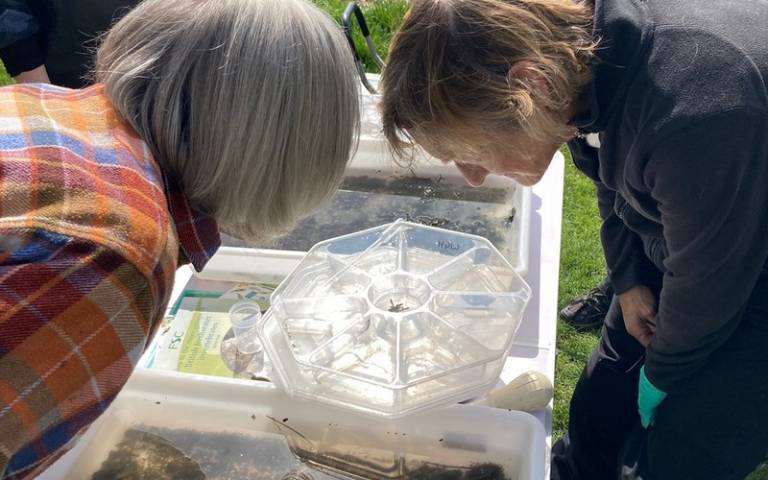River-based citizen science project to help reverse biodiversity loss in East London
A collaborative project led by UCL to identify and record river invertebrates in and near the River Lea is helping local organisations to monitor natural habitats and inform conservation efforts.

14 December 2023
The River Lea provides drinking water for thousands of Londoners and habitats for thousands of plant and animal species. However, pollution and land management issues are destroying natural habitats and affecting how local people can use it. The Lea passes through the new UCL East campus in Stratford, East London. UCL staff and students are working hard with local community and conservation groups, to reverse the decline.
Dr Isabel Bishop (UCL Centre for Biodiversity & Environment Research), a freshwater ecologist in UCL’s recently established People & Nature Lab, is collaborating with local organisations to help to address concerns about the river’s health.
“The River Lea is complicated and has multiple issues that affect its wildlife habitats,” Dr Bishop explains. “Pollution is a big problem, with sewage discharges and agricultural run-off affecting oxygen levels and plastic waste endangering wildlife.”
To tackle the issues, local organisations including Thames21 and The Wildlife Gardeners of Haggerston are leading restoration projects to introduce reedbeds that help to oxygenate the water. They are also installing wood structures to attract sediment that will encourage plant life, providing new habitats for insects and invertebrates.
In collaboration with the organisations, Dr Bishop is collecting data on invertebrates that live in and close to the river to explore how and when their numbers change. The information will provide much-needed evidence to support drives to change local behaviours, such as in repairing misconnected domestic sewerage.
“We are working with local community organisations to understand how the ecosystems around the River Lea are functioning, with the aim of improving plant and insect life in the area,” Dr Bishop says.
Once a month, a team of up to 10 volunteers from local community groups, including UCL students and staff, spend several hours collecting invertebrates from the river. The creatures are identified and recorded using an app as part of the national Riverfly Partnership. The changes in the numbers of invertebrates provides an indicator of water quality. As well as informing local activities, the data is fed to national biological records centres and helps to inform UK policy-making.
UCL students are also using the data to compare how different habitats are faring under the pressures of human activity and climate change.
The project is set to expand with a workshop involving 30 citizen scientists who will work together to develop additional ways to monitor pollution in the River Lea.
The citizen science project will also support Dr Bishop’s work with the UN Environment Programme (UNEP) World Water Quality Alliance to develop meaningful methodologies to measure progress towards achieving SDG Target 6.3 to improve water quality.
“We are testing the principles of using citizen science data to monitor progress towards SDG6,” explains Dr Bishop, who is lead author of a technical briefing for UNEP.
 Close
Close


